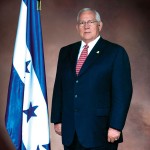
TEGUCIGALPA, Honduras — Protesters demanding the return of their ousted president clashed with police and army troops here Monday, as the day-old provisional government found itself severely isolated with world leaders from President Barack Obama to Venezuela’s Hugo Chávez condemning Sunday’s coup.
In an interview with The Wall Street Journal, Honduras’s acting leader Roberto Micheletti defended the forced exile of President Manuel Zelaya, who was escorted out of the country in his pajamas at gunpoint by military troops. He said the military wasn’t subverting democracy, but protecting it from Mr. Zelaya’s plans to change the constitution so he could run for re-election.
“We are acting within the law,” said Mr. Micheletti, a member of Mr. Zelaya’s own political party and leader of Honduras’s Congress, who was sworn in as president hours after troops stormed the presidential palace. Mr. Zelaya, he said, “is now suffering the consequences of having broken the law.”
Mr. Zelaya told Latin American leaders meeting in Nicaragua that he would return to Honduras Thursday to reclaim his presidency, after addressing the United Nations on Tuesday. But Mr. Micheletti said the ousted leader would have to face legal charges if he returned. He promised the country would hold presidential elections as scheduled in November, and that he would step down in January, when Mr. Zelaya’s term was due to end.
Mr. Micheletti called for “understanding” from other nations, especially the U.S. “If [the U.S.] does not recognize us, it would be condemning to failure the aspirations of Hondurans,” he said. Comparing Mr. Zelaya to former U.S. President Richard Nixon, he added, “At least Mr. Nixon had the courage to resign after breaking the law.”
Not far from where Mr. Micheletti was speaking, scores of protesters loyal to Mr. Zelaya gathered outside the presidential palace and clashed with police, hurling Molotov cocktails and rocks. Police responded by firing tear gas. Several shots rang out, though it was unclear if they were warning shots or were directed at the protesters. As a nighttime curfew descended, some radio and TV news stations remained off the air.
Several leftist Latin American leaders met in Nicaragua on Monday to discuss how to manage the first coup in Central America since the end of the Cold War. Mr. Zelaya was greeted like a hero by allies including Venezuela’s Mr. Chávez, Nicaragua’s Daniel Ortega, and Ecuador’s Rafael Correa. Ten Latin American countries agreed to withdraw their ambassadors from Honduras until Mr. Zelaya is returned to power.
Mr. Chávez cast the dispute in Honduras as a wider rebellion by the region’s poor against elites. Mr. Chávez threatened to “overthrow” Mr. Zelaya’s replacement, Mr. Micheletti. In response, Mr. Micheletti told local Honduras radio: “Nobody scares us.”
Mr. Obama found himself in the unusual situation of siding with Mr. Chávez to a point, describing the situation as a “coup” that was “illegal” and would set a “terrible precedent” were it allowed to stand.
While the U.S. backed Mr. Zelaya, Secretary of State Hillary Clinton also signaled Monday that the U.S. might try to find a negotiated solution that didn’t necessarily mean returning Mr. Zelaya to power. “We haven’t laid out any demands that we’re insisting on, because we’re working with others on behalf of our ultimate objectives, which are shared broadly,” she said.
The Organization of American States called for Mr. Zelaya’s return and set a meeting for Tuesday that could suspend Honduras from the body under its democratic charter adopted in 2001 — an effort to put Latin America’s long history of coups and dictatorships behind it.
Isolation from the international community may not be enough to create cracks in Honduras’s political establishment, which appeared to be solidly against Mr. Zelaya. But some analysts said his forced exile was a political mistake by his opponents.
“Zelaya did not have overwhelming support to begin with,” said John Carey, a Latin America expert at Dartmouth College. “Now the military has alienated every other country in that hemisphere.”
Among Hondurans, reaction was divided between pro-Zelaya demonstrators and those who were dismayed to find the world lining up against his overthrow.
“The ousting…may have been shocking, but there are enough reasons for it,” José Batres, who is studying for his MBA at Loyola University New Orleans, wrote in an email. A blog called hondurans4democracy said the “silent majority” of Hondurans supported the ouster.